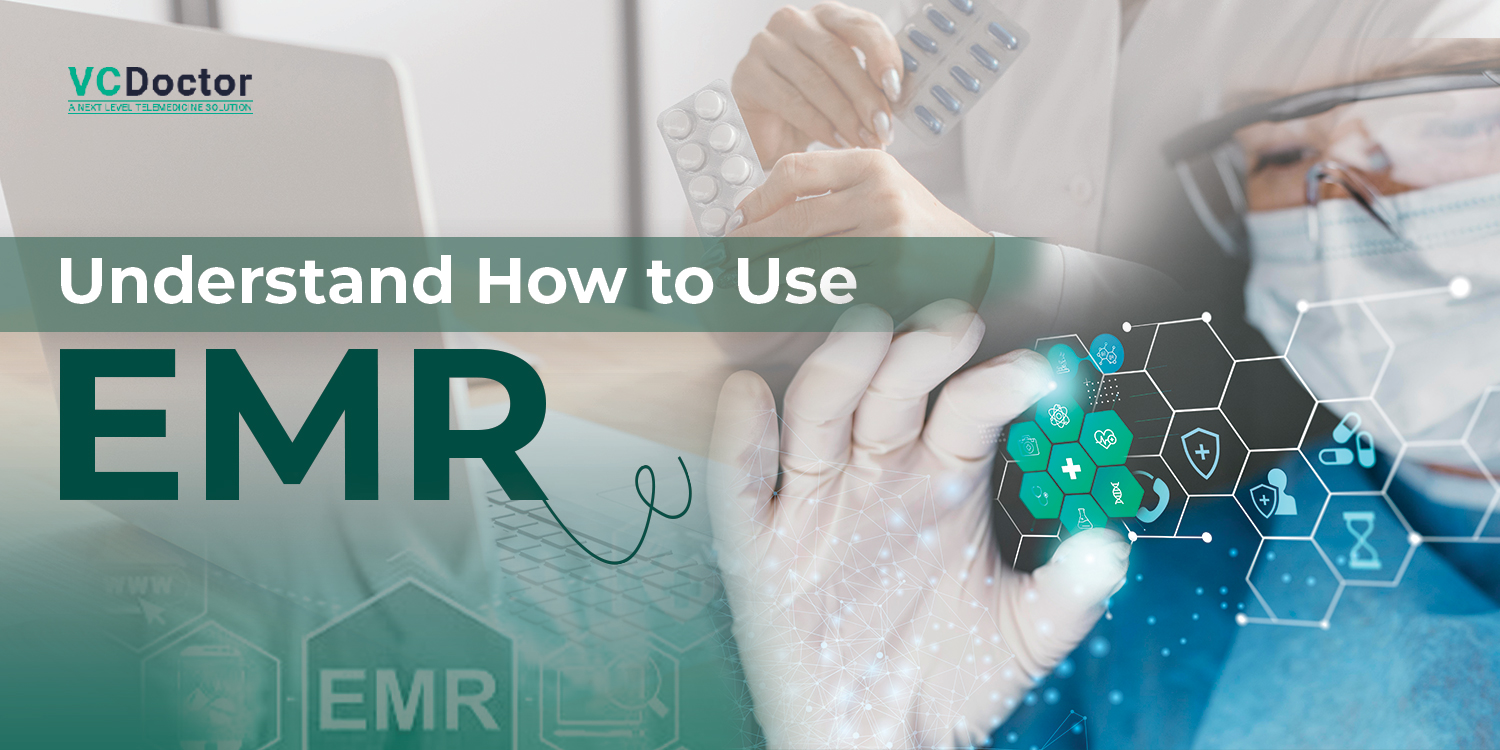Understand How to Use EMR?
We now handle our health information in a very different way. Electronic Medical Records have become the foundation of modern healthcare as new technology replaces old paper charts with secure digital systems. It enhances the care coordination of patients and increases accuracy and efficiency. Users can store numerous details about your medical history, including diagnoses, prescriptions, allergies, test results, and doctor notes in EMR systems.
Eventually a more knowledgeable and empowered approach to patient care is all made possible by this consolidated repository. Therefore it provides numerous advantages to both patients and healthcare providers. Explore how you may use electronic medical records to take an active role in your health care by delving further into their realm.
Table of Contents
- What is EMR?
- 5 Major Types of EMR
- Getting Started with EMR Access
- Navigating EMR Software
- EMR vs. EHR: What’s the Difference?
- Benefits of Utilizing EMRs:
- The Future of EMRs: Continued Evolution and Benefits
- Conclusion
- FAQs
What is EMR?
The term EMR means “electronic medical records”. People also address EMR as electronic health records “EHR”. Although they have slight differences, the concept is the same as it is a software program to store the patient’s data in digital form. EMR makes it convenient and easy to store medical data in a secure place, and Doctors and patients can access them whenever they need. Additionally, users can also share the data through the connected network and other systems within secured platforms.
5 Major Types of EMR
Modern technology is enhancing the capacity of the EMR system. As technology evolves, developers are designing dedicated EM or Software that functions on selected services. Let’s check out five major types of EMR systems.
1. Ambulatory EMRs: These devices are designed specifically for usage in outpatient clinics and physician offices. They handle patient management during consultations, focusing on basic lab findings, medications, diagnoses, and allergies.
2. Acute Care EMRs: Designed with hospitals and ER environments in mind, these EMRs place a high value on the instantaneous collection and retrieval of data. Throughout a patient’s hospital stay, they manage medicine administration, critical care emergencies, and thorough documentation.
3. Server-Based EMRs: These systems are housed on the physical servers of the healthcare provider. Although there is greater control over data protection, this necessitates a large infrastructure investment and upkeep.
4. Cloud-Based EMRs: These electronic medical records are kept on distant servers that are managed by an outside company. This removes the requirement for equipment on-site, but it also presents questions around data security and possible reliance on internet access.
5. Hybrid EMRs: This method blends cloud-based and server-based components. Whereas certain features or disaster recovery backups may be handled in the cloud, the provider’s server may hold the essential patient data. This provides a harmony between command and adaptability
Getting Started with EMR Access
How Can Users View Electronic Medical Records?
Several healthcare providers provide online platforms connected to their EMR systems, and patient portal app. Usually, you’ll need to register online or through the office of your healthcare practitioner in order to get access. Usually, this registration procedure includes setting up a password-protected username.
What Data Usually Is Visible on a Patient Portal?
Your patient portal may provide a number of functions when you log in, such as:
- Examining Your Medical History: You may obtain lists of diagnoses, prescriptions, allergies, and vaccination records.
- Making Appointments: You can make electronic requests for medication refills and schedule new appointments.
- Secure Communication: For non-urgent issues or queries, message your healthcare professionals.
- Revising Your Data: Maintain your insurance data and contact information up to date on the portal.
What Happens If a Medical Professional Doesn’t Provide a Patient Portal?
If your physician does not have a patient portal user can obtain a physical or electronic copy of their digital medical records. However, there can be additional costs, so find out exactly how much in advance.
Navigating EMR Software
Using the Patient Portal to Navigate
- Examine Your Health Information Actively: Check the accuracy and completeness of your medical records on a regular basis. Please don’t hesitate to contact your healthcare practitioner if you see any errors or information that is missing.
- Ask inquiries: Be bold and courageous! Use the secure messaging function to ask your provider any questions you may have about your prescriptions, treatment plans, or medical records.
- Keep Up-to-Date Information: Keeping up-to-date contact and insurance information on the portal helps streamline communication and reduce delays.
- Communicate Efficiently: The encrypted messaging tool is perfect for inquiries or problems that are not urgent. For difficult illnesses or concerns that need to be addressed right away, make an appointment with your healthcare practitioner.
- Get Your Records and Store Them: Download copies of your medical records software on a regular basis to keep on file or to distribute to other healthcare professionals as required. By doing this, you may be confident that copies are available to you in an emergency or while changing service providers.
Taking Security Into Account While Using Patient Portals:
- Select Tough Passwords: Make sure your patient portal password is strong and distinct. Don’t use information that may be guessed, such as pet names or birthdays. Consider utilizing a password manager to create and safely save complicated passwords.
- Use Caution When Sharing Information: Think carefully before sharing any information using the messaging tool. It is advisable to share sensitive information with your healthcare professional directly during visits.
- Observe Any Suspicious Behavior: Check your portal often for any unusual activity, such as unwanted login attempts or information modifications. Notify your healthcare practitioner right away if you see anything strange.
EMR vs. EHR: What’s the Difference?
| EMR (Electronic Medical Record) | EHR (Electronic Health Records) |
| It is mostly used by doctors for diagnosis and treatment | It is used by doctors for decision-making to improve health outcomes |
| The medical records are not shared outside clinical or hospitals | There are facilities for sharing patients’ information with other healthcare providers and hospitals |
| It’s a digital form of a patient’s health chart | It’s a digital form of a patient’s complete health information, including lab reports of symptoms |
| Its end-users are mainly nurses and doctors | Its end-users are physicians, receptionists, billing department, medical coders, and other HCPs |
| EMR mainly focuses on data from a single particle of facility | EHR is mainly focused on encompassing data from multiple sources |
Benefits of Utilizing EMRs:
- Care Coordination: Regardless of where you got care, electronic medical records provide seamless information sharing between authorized healthcare providers. It creates a more complete picture of your health, which helps with diagnosis and better informs treatment decisions.
- Accuracy and Efficiency: EMR reduces wait times and improves communication by streamlining healthcare professionals’ operations and eliminating the possibility of mistakes that come with handwritten data.
- Patient Involvement: Many EMR systems include safe online patient portals where you may examine important details about your medical data, prescription lists, and summary of appointments. Additionally, users can now actively take part in making knowledgeable healthcare decisions.
- Medication Management: Electronic medical records help patients to get more effective medicine and users can store the data of their previous medication. It will help the doctors to understand any previous allergies or medication discomfort that can lead to severe allergies or reaction.
- Healthcare Costs: Since electronic medical records are easily available. It may reduce the need for pointless testing and procedures.
- Disaster security: in an emergency situation, it is very hard to recall the data or any previous treatment. Therefore, when a user secures their data in EMR, then they can easily recall it any time without losing it. Additionally, they can also access the data from anywhere with their system.
The Future of EMRs: Continued Evolution and Benefits
EMR healthcare services are constantly evolving with new features and functionalities. Here are some exciting possibilities on the horizon:
- Connectivity with Wearable Devices: Electronic medical records (EMRs) have the potential to be easily integrated with wearable health trackers, enabling the continuous monitoring of health data and vital indicators (blood pressure, heart rate, and activity levels). Your healthcare practitioner may benefit greatly from these real-time data. It can also help to customize your treatment regimens.
- Advanced Analytics and Personalized Medicine: By analyzing EMR data, medical professionals can create customized treatment regimens. It will take into account a patient’s unique medical background, risk factors, and genetic composition. Therefore, it may result in better health outcomes and more focused therapies.
- Better Tools for Patient Engagement: Patient portals may become more interactive, including informational materials, tools to assist in making decisions, and tailored wellness advice based on your health information. It will offer a more comprehensive method of managing healthcare.
Get your Custom EMR Software by the developers of VCDoctor
Conclusion
You take an educated and active role in your healthcare journey by learning how to use and effectively use EMRs. EMRs have several benefits, ranging from easy access to medical information and faster provider contact to possible future gains like customized care. Recall that strength comes from knowledge. Take use of the opportunity presented by electronic medical records (EMRs) to take charge of your health and adopt a proactive approach to your wellbeing. Inquire, evaluate your data proactively, and work with your healthcare providers to achieve the greatest possible health outcomes. As EMR technology advances, there are truly limitless opportunities to improve healthcare delivery and empower individuals.
FAQs
1. What are security parameters with EMR?
Your medical privacy is protected by electronic medical records that follow the strict HIPAA regulations. Requests for access, correction, and copies of your EMR data are possible. It’s critical to learn how your healthcare provider manages sharing and access to your medical records.
2. What Happens If I don’t Agree to Anything in My EMR?
If you find any mistakes or information is missing from your electronic medical record, you have the right to request a correction. Get in touch with your medical professional, outline the differences, and forward any pertinent documents you may possess. They should investigate the matter and update your records as needed.
3. Will My EMR Be Accessible Everywhere I Receive Care?
The capacity for secure data interchange between various EMR systems, or interoperability. Although interoperability is not currently widely available, it is steadily getting better. You may still be required to give a copy of your EMR or permission to access your patient portal while you are receiving care from a new physician who does not utilize the same EMR system.
Q.4 What are the limitations of an EMR?
One of the biggest limitations of an EMR i.e, storing sensitive patient data in the cloud which comes with a risk of data breaches. Because there are not sufficient layers of security.
Q.5 What does EMR store??
An electronic medical record stored patient’s chart data. Which includes demographics, medical history, diagnosis, medications, laboratory and radiology data etc.
Q.6 What is the need for EMR?
The main use of EMR is to provide all the necessary data to healthcare professionals. Which can help in better decision making that leads to better patient care.




